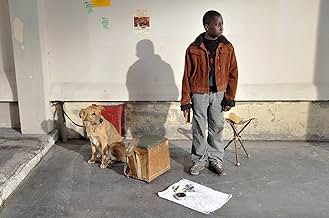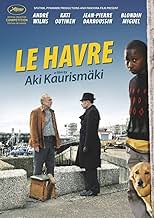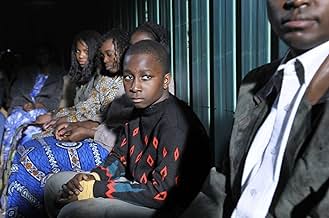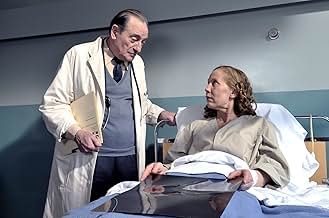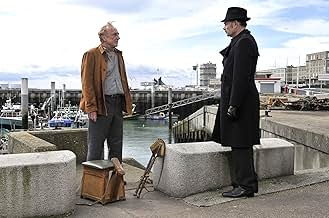AVALIAÇÃO DA IMDb
7,2/10
25 mil
SUA AVALIAÇÃO
Quando um menino africano chega de navio cargueiro à cidade portuária de Le Havre, um engraxate idoso fica com pena da criança e a recebe em sua casa.Quando um menino africano chega de navio cargueiro à cidade portuária de Le Havre, um engraxate idoso fica com pena da criança e a recebe em sua casa.Quando um menino africano chega de navio cargueiro à cidade portuária de Le Havre, um engraxate idoso fica com pena da criança e a recebe em sua casa.
- Direção
- Roteirista
- Artistas
- Prêmios
- 15 vitórias e 34 indicações no total
Quoc Dung Nguyen
- Chang
- (as Quoc-Dung Nguyen)
Little Bob
- Little Bob
- (as Roberto Piazza)
Avaliações em destaque
These days it seems that French films predominantly fit into one of two categories: Smug, over long and preachy, such as Rust and Bone or Little White Lies. Or they produce deeply involving but simplistic stories containing the most genuine heartfelt emotion such as Amour (in French, therefore French) or The Kid with a Bike. I am happy to say that Le Havre falls in the latter group. In fact the story here is one of pure simplicity and the tone of the film contains nothing but genuine optimism towards the theme of human compassion. That is it, this film has no ulterior motive or no gimmicks, and it is a very simply and extremely involving story based around that one simple theme. However, this film is not just a tribute to human compassion, but contained within it are tributes to the history of cinema that are quite simply a joy to experience. When I say that, the use of music as well the way certain scenes are lit pay a respectful tribute to films of the 40s and 50s throughout the narrative.
This is not to say that this film is not without its realism, Marx and his neighbours all live a humble life bordering on poverty. The plight of Idrissa is unenviable and there is an honest depiction of a refugee camp just outside Calais. However, the theme of Le Havre is not that life is simply good, that would be naive. It is how these characters deal with life and the situations that it presents. Of course it would be so easy to fall into to the trap of patronising and borderline preachy cliché here, but this never happens due to the genuine feeling of honesty depicted throughout the narrative. Every character is presented very honestly with all their flaws quite clear to see, but it is their ability for natural compassion that drives the narrative forward. By the time Le Havre reaches its very satisfying conclusion where there are no loose ends, it is difficult not to feel that not only have you been entertained, but also enlightened.
This is not to say that this film is not without its realism, Marx and his neighbours all live a humble life bordering on poverty. The plight of Idrissa is unenviable and there is an honest depiction of a refugee camp just outside Calais. However, the theme of Le Havre is not that life is simply good, that would be naive. It is how these characters deal with life and the situations that it presents. Of course it would be so easy to fall into to the trap of patronising and borderline preachy cliché here, but this never happens due to the genuine feeling of honesty depicted throughout the narrative. Every character is presented very honestly with all their flaws quite clear to see, but it is their ability for natural compassion that drives the narrative forward. By the time Le Havre reaches its very satisfying conclusion where there are no loose ends, it is difficult not to feel that not only have you been entertained, but also enlightened.
Great. Very stylistic in its cinematography and lighting. Condensed and to the bone in its storytelling and editing.
Nice and subtle humour on the background of a highly contemporary story about our unbalanced globe, the hope for freedom and the power of human compassion.
I Truly enjoyed watching a film in which every scene is so carefully and skillfully arranged. This is Kaurismäki at his best working with a great cast and a script stripped of any unnecessary dialogue. The colors and the settings are stunning. There's always a risk that movies like this would come across as to polished or constructed, but from my point of view Kaurismäki strikes a great balance and makes sure that every image adds layers and details to the story.
Nice and subtle humour on the background of a highly contemporary story about our unbalanced globe, the hope for freedom and the power of human compassion.
I Truly enjoyed watching a film in which every scene is so carefully and skillfully arranged. This is Kaurismäki at his best working with a great cast and a script stripped of any unnecessary dialogue. The colors and the settings are stunning. There's always a risk that movies like this would come across as to polished or constructed, but from my point of view Kaurismäki strikes a great balance and makes sure that every image adds layers and details to the story.
The natural flowing of this simple movie, where no excesses are to be noticed ,may make one judge it as a weird movie, where something actually happens, but does seem to affect the lives of the characters. This is not properly true. Indeed, this is a simple movie, with no plot twists, no complications, but here does it lie its magic. It's a movie where "normal", common people simply accept their lives for what they are, which does not mean in a passive way, on the contrary they prove morally resilient people, who relate one another in an authentic way, behave as honest and fair people (so difficult to find people like these nowadays, that they look so strange!) they face bad things with dignity, and good things with no easy enthusiasm. Its best quality lies in the perfect and never clashing blend between hard facts (the hardships of immigrants, the theme of illness) and poetry, with a human faith in miracles which never sounds ridiculous or mystical: miracles happen simply because sometimes they may happen, and there's not even much to wonder at. There's such a placid attitude shown by the characters, very well interpreted by a good cast, that if the aim was to convey a calm and resilient acceptance of life, with its weird mixture of hardness and poetry, well, the aim has been successfully accomplished.
In 1992, Finnish director Aki Kaurismaki directed LA VIE DE BOHEME, where he transplanted to Paris for a story of impoverished, failed artists on the cusp of society. A funny, sad film about art, love, and loss. Nearly twenty years later, Kaurismaki returns to France in LE HAVRE; while some of the humor remains, its story of the impoverished and dispossessed is even more affecting.
LA VIE... showed a painterly visual sense, all the more amazing that it was filmed in black and white. LE HAVRE boasts an equally striking visual sense, with scenes that seem to glow. That said, other elements of the production are less convincing - and at times. almost embarrassing. (For example, a group of black refugees are locked in a container crate for almost a week; when it's opened, no one's hungry or even concerned, and several are freshly shaved.)
LE HAVRE sets up the camera in a stationary spot - much like an old silent - giving the film a real resonance. But this affection for older filmmaking will be familiar for Kaurismaki fans; his silent, black and white JUHA uses the same minimalistic approach, with good results.
If you're willing to forgive certain production details and the dependence on melodrama, LE HAVRE is a feel-good story of how those of modest means can help those in desperate straits. (LE HAVRE itself was directed under low budget.) The film's humanism is its saving grace. While the filmmaking is occasionally awkward, there's still a lot to be admired here.
LA VIE... showed a painterly visual sense, all the more amazing that it was filmed in black and white. LE HAVRE boasts an equally striking visual sense, with scenes that seem to glow. That said, other elements of the production are less convincing - and at times. almost embarrassing. (For example, a group of black refugees are locked in a container crate for almost a week; when it's opened, no one's hungry or even concerned, and several are freshly shaved.)
LE HAVRE sets up the camera in a stationary spot - much like an old silent - giving the film a real resonance. But this affection for older filmmaking will be familiar for Kaurismaki fans; his silent, black and white JUHA uses the same minimalistic approach, with good results.
If you're willing to forgive certain production details and the dependence on melodrama, LE HAVRE is a feel-good story of how those of modest means can help those in desperate straits. (LE HAVRE itself was directed under low budget.) The film's humanism is its saving grace. While the filmmaking is occasionally awkward, there's still a lot to be admired here.
Protagonist is Marcel Marx, A Shoeshiner, who makes a peaceful living with his wife Arletty and a dog Laika in city of Le Havre. He incidentally meets an African boy, Idrissa, who is being sought by French authorities as illegal immigrant. Marcel opens his doors to the boy and helps him make his way to join his mother across the water in London.
Despite the complication of Arletty's terminal illness, about which Marcel is not aware, the snooping of grim-faced inspector Monet, and the machinations of the neighborhood snitch, with the help of neighbors and friends that Marcel was deeply in debt to forgive everything for Idrissa, Marcel tries to help the boy.
Kudos to Aki Kaurismäki, the director of Le Havre, for his directorial talent he has exhibited in this movie. No loose ends, characterization and usage of every character is excellent and has kept it very simple by all means.
Once in while you get to watch such an optimistic film that shows love, respect and tolerance for one another in a very simple and practical manner.
Follow Us @ : https://www.facebook.com/theworldmoviejournal
Reviews @ : http://theworldmoviejournal.wordpress.com/
Despite the complication of Arletty's terminal illness, about which Marcel is not aware, the snooping of grim-faced inspector Monet, and the machinations of the neighborhood snitch, with the help of neighbors and friends that Marcel was deeply in debt to forgive everything for Idrissa, Marcel tries to help the boy.
Kudos to Aki Kaurismäki, the director of Le Havre, for his directorial talent he has exhibited in this movie. No loose ends, characterization and usage of every character is excellent and has kept it very simple by all means.
Once in while you get to watch such an optimistic film that shows love, respect and tolerance for one another in a very simple and practical manner.
Follow Us @ : https://www.facebook.com/theworldmoviejournal
Reviews @ : http://theworldmoviejournal.wordpress.com/
Você sabia?
- CuriosidadesThe character Marcel Marx, played by André Wilms, first appears in A Vida da Boêmia (1992). Jean-Pierre Léaud also appears in both films, but as different characters.
- Citações
Marcel Marx: L'argent circule au crepuscule.
- ConexõesFeatured in At the Movies: Cannes Film Festival 2011 (2011)
- Trilhas sonorasMatelot
Performed by The Renegades
Principais escolhas
Faça login para avaliar e ver a lista de recomendações personalizadas
- How long is Le Havre?Fornecido pela Alexa
Detalhes
Bilheteria
- Orçamento
- € 3.850.000 (estimativa)
- Faturamento bruto nos EUA e Canadá
- US$ 611.709
- Fim de semana de estreia nos EUA e Canadá
- US$ 26.363
- 23 de out. de 2011
- Faturamento bruto mundial
- US$ 12.959.706
- Tempo de duração
- 1 h 33 min(93 min)
- Cor
- Proporção
- 1.85 : 1
Contribua para esta página
Sugerir uma alteração ou adicionar conteúdo ausente


